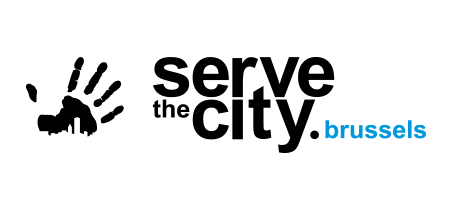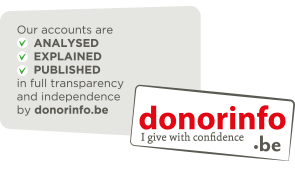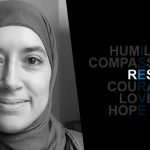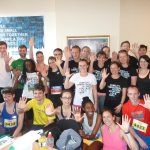Once every other week all the way up until the Big Volunteer Week, we will highlight the values of Serve the City (Humility, Compassion, Respect, Courage, Love, Hope). Each value will be represented by different people from diverse cultures, backgrounds, professions and ages.
Today we present a story of Hope:
Here at Serve the City, we often say that we are “crossing the line” or that “it’s time to cross the line.” This refers to the invisible or tangible line that separates the general population of the city, with those that are struggling for survival. It’s easy to ignore this line, to pretend that those on the other side are a generalisation – “the homeless”. It’s difficult to cross that line, to give those people a name. It takes courage.
Wayne Humza is a volunteer at Serve the City with an abundance of hope, but also a unique situation because he is also on the other side of that line. Wayne is an asylum seeker here in Brussels, originally from Uganda. He managed to make it to Belgium after he lost his family and needed to leave the country.
He explains, “when I came here I was kind of desperate, you know? They throw you in a boat and you don’t know anyone, and all the people I met were like, ‘tu parles français?” and I was like, ‘no’.” He managed to make it to a centre for asylum seekers, but he says “everything wasn’t right because I couldn’t get someone I could talk to…No one could go further than four or five words in English.”
His first week there, he is told that some ladies have come who speak English, and they have come with some games to spend time with the people there. He thinks it sounds fun so he goes to meet them and he’s introduced to Jodi and five other volunteers with Serve the City.
“So we start the conversation, and we play Jenga, and I’ve never played Jenga before, and we play Uno, and I’ve never played Uno before. It was fun, that night, it was my first time seeing them, and they were the first people I’ve spoken to for [more than] thirty minutes.”
After he met them he says, “in this moment of them coming, one thing I realised about them, was that they wanted to create friendships with the people…I know that could help me survive. How I’m surviving today is that I…have friends.”
He met with them every week and a couple weeks later one of the volunteers told him about Big Volunteer Week and asked if he wanted to help, and he agreed to go.
“I get there. I meet different kinds of people, hundreds of people…I realised something. I feel like I’m in need, but there are people who are really in need. I went out to serve and I realised…that I have stuff that can keep me going. I feel like maybe I cannot give financially, but at least I have the energy to give. So I decided to start doing things like that, and getting involved more and more.”
He explains, “when I first came here I had lost it, because I thought about what I had been through and I was just somewhere I don’t even know. I don’t know what the future has for me. By then, all I needed was some people you could talk to…and when you talk to people like Jodi they always give you something inspirational…That gave me inspiration to be like, ‘if these people came and served me. They did all of those things to [help me figure out] that this is not the end of life, being a refugee.”
Wayne especially loves helping with kids who are asylum seekers, or whose parents have these really difficult problems to deal with, because he says, “Kids will always be kids, whatever the situation is. You play with this kid, you run around and jump around, at least you see a smile on someone’s face, you know? A smile is hard to get out of someone.”
“It’s been an amazing journey with Serve the City,” he says, “It was really fun, and it’s still fun. I’m still here, for the next fifty years, or who knows.”
Join us for the Big Volunteer Week to meet Wayne and other amazing people!







